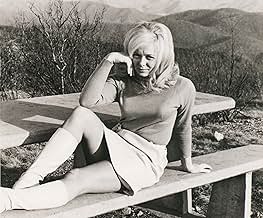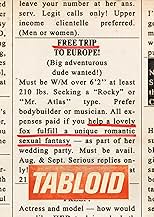IMDb-BEWERTUNG
7,0/10
7391
IHRE BEWERTUNG
Füge eine Handlung in deiner Sprache hinzuA documentary on a former Miss Wyoming who is charged with abducting and imprisoning a young Mormon Missionary.A documentary on a former Miss Wyoming who is charged with abducting and imprisoning a young Mormon Missionary.A documentary on a former Miss Wyoming who is charged with abducting and imprisoning a young Mormon Missionary.
- Auszeichnungen
- 4 Gewinne & 9 Nominierungen insgesamt
Handlung
WUSSTEST DU SCHON:
- WissenswertesFilmmaker Errol Morris was sued by Joyce McKinney, the central figure of the documentary for allegedly tricking her into appearing in the film.
Ausgewählte Rezension
Behind the adorable blonde hair and sweet, innocent-girl smile lies a checkered and intriguing past in Joyce McKinney's life. Errol Morris's Tabloid is one of the most mature documentaries I've ever witnessed. The documentarian who is known for making very deep and personal stories goes out of his way to shed light on a scandal that hasn't gotten much talk or publicity in recent years. But maybe that is for the best.
In 1977, a young Mormon missionary named Kirk Anderson was abducted by an unknown woman from The Church of Jesus Christ of Latter-Day Saints in Ewell, Surrey. A few days later, he returned claiming he was kidnapped by a woman named Joyce McKinney, a young woman who was crowned Miss Wyoming, who attempted to seduce him and rape him while he lay bounded on a bed.
McKinney was arrested, and the case was dubbed "The Mormon sex in chains case." It was shocking and absurd for the time period as well. Keep in mind that back in the 1970's, Mormonism was thought to be more of a strange cult than a religion. Society wasn't as accepting as today, and that's why people were so quick to jump over everyone involved.
When conducting interviews with numerous people, Morris doesn't dare interrupt. It's a one-setting documentary involving Errol Morris's famous "Interrotron " method. The Interrotron is where Morris places a two way mirror in front of the camera so both parties can see each others faces. It's a way of pretending the camera doesn't exist or isn't really there. This method is used to try and get more out of the person and not have the eerie feeling of being filmed while discussing.
But I don't believe Joyce McKinney or anyone else in the film really cares that they're being filmed. I think they're so flattered that they're finally telling their side of the story. Why did I call this "on of the most mature documentaries I've ever witnessed?" Because Morris doesn't incorporate any opinion or stance within the film. He doesn't even state if he believes the characters are telling the truth or not. He just wants each person to tell their side of the story the way they feel it should be told.
It's also interesting to note that the music in the documentary is so radiant and so important to the storytelling in the film. Never do we really pay attention or notice the music in a documentary, but the tonality in Tabloid is depicted strongly throughout the background music. After all, the film doesn't move around too much. It's shot in a one-setting location against a gray backdrop with the characters talking one on one with the camera.
We see montages from older films, reenactments of certain key events, and little animated tabloid pictures compiled into a creative montage to tell certain parts of the story. The film is titled "Tabloid" because Joyce McKinney began to develop into a popular figure publicized in magazines. So many stories were published about her that the truth became distorted. She states honestly and chillingly in the documentary "a person can tell a lie so many times that they believe it's true." You will definitely leave Tabloid confused and curious. We learned so much, but how much of it is true? We may never really know. I personally believe most everything brought to the table here, but then again, the lack of evidence on McKinney's part perplexes me. It is explained at the end where all the evidence went, but the believability is highly questionable.
According to Former Missionary Troy Williams, the story of the Mormon sex in chains case has been brought to light in three scenarios. Scenario one he was chloroformed, tied up, raped, and forced to be the sex slave of McKinney. Otherwise known as Kirk's side of the story. Scenario two is Joyce McKinney's side of the story where she wanted Kirk to be "free" of the Mormon's ways. So she "rescued" him from the church and they planned to run off, have kids, and life a life of peace. Scenario three is a hybrid of the two. Where Joyce and Kirk planned a life together, but somewhere along the line he refused it and backed out.
Joyce McKinney's last time in the light before this film was when she hired a Korean doctor to clone her own dog "Booger" after his death. McKinney even states in the film that she herself believes it strange that a person could go from someone who "kidnaps a Mormon man and uses him as a sex slave" to someone who hires a person to clone her own dog.
McKinney now resides in the mountain ranges of North Carolina living a life of celibacy, solitude, and peace from the people and the press. Maybe that's for the best on both parts. Here we have a woman who has spent most of her life in the spotlight for such a shady case, maybe it's time to just let her rest.
Tabloid is one of 2011's best documentaries, but the subject matter will have a lot of potential viewers looking the other way. Ignore the subject matter, just dive into the film hoping to see a very thought-provoking, well made, serious documentary made by a filmmaker who knows how to dish out a very personal story. The film's way of style and tonality is beautifully crafted, and erects one of the most shocking yet intriguing sex scandals in history.
Starring: Joyce McKinney and Troy Williams. Directed by: Errol Morris.
In 1977, a young Mormon missionary named Kirk Anderson was abducted by an unknown woman from The Church of Jesus Christ of Latter-Day Saints in Ewell, Surrey. A few days later, he returned claiming he was kidnapped by a woman named Joyce McKinney, a young woman who was crowned Miss Wyoming, who attempted to seduce him and rape him while he lay bounded on a bed.
McKinney was arrested, and the case was dubbed "The Mormon sex in chains case." It was shocking and absurd for the time period as well. Keep in mind that back in the 1970's, Mormonism was thought to be more of a strange cult than a religion. Society wasn't as accepting as today, and that's why people were so quick to jump over everyone involved.
When conducting interviews with numerous people, Morris doesn't dare interrupt. It's a one-setting documentary involving Errol Morris's famous "Interrotron " method. The Interrotron is where Morris places a two way mirror in front of the camera so both parties can see each others faces. It's a way of pretending the camera doesn't exist or isn't really there. This method is used to try and get more out of the person and not have the eerie feeling of being filmed while discussing.
But I don't believe Joyce McKinney or anyone else in the film really cares that they're being filmed. I think they're so flattered that they're finally telling their side of the story. Why did I call this "on of the most mature documentaries I've ever witnessed?" Because Morris doesn't incorporate any opinion or stance within the film. He doesn't even state if he believes the characters are telling the truth or not. He just wants each person to tell their side of the story the way they feel it should be told.
It's also interesting to note that the music in the documentary is so radiant and so important to the storytelling in the film. Never do we really pay attention or notice the music in a documentary, but the tonality in Tabloid is depicted strongly throughout the background music. After all, the film doesn't move around too much. It's shot in a one-setting location against a gray backdrop with the characters talking one on one with the camera.
We see montages from older films, reenactments of certain key events, and little animated tabloid pictures compiled into a creative montage to tell certain parts of the story. The film is titled "Tabloid" because Joyce McKinney began to develop into a popular figure publicized in magazines. So many stories were published about her that the truth became distorted. She states honestly and chillingly in the documentary "a person can tell a lie so many times that they believe it's true." You will definitely leave Tabloid confused and curious. We learned so much, but how much of it is true? We may never really know. I personally believe most everything brought to the table here, but then again, the lack of evidence on McKinney's part perplexes me. It is explained at the end where all the evidence went, but the believability is highly questionable.
According to Former Missionary Troy Williams, the story of the Mormon sex in chains case has been brought to light in three scenarios. Scenario one he was chloroformed, tied up, raped, and forced to be the sex slave of McKinney. Otherwise known as Kirk's side of the story. Scenario two is Joyce McKinney's side of the story where she wanted Kirk to be "free" of the Mormon's ways. So she "rescued" him from the church and they planned to run off, have kids, and life a life of peace. Scenario three is a hybrid of the two. Where Joyce and Kirk planned a life together, but somewhere along the line he refused it and backed out.
Joyce McKinney's last time in the light before this film was when she hired a Korean doctor to clone her own dog "Booger" after his death. McKinney even states in the film that she herself believes it strange that a person could go from someone who "kidnaps a Mormon man and uses him as a sex slave" to someone who hires a person to clone her own dog.
McKinney now resides in the mountain ranges of North Carolina living a life of celibacy, solitude, and peace from the people and the press. Maybe that's for the best on both parts. Here we have a woman who has spent most of her life in the spotlight for such a shady case, maybe it's time to just let her rest.
Tabloid is one of 2011's best documentaries, but the subject matter will have a lot of potential viewers looking the other way. Ignore the subject matter, just dive into the film hoping to see a very thought-provoking, well made, serious documentary made by a filmmaker who knows how to dish out a very personal story. The film's way of style and tonality is beautifully crafted, and erects one of the most shocking yet intriguing sex scandals in history.
Starring: Joyce McKinney and Troy Williams. Directed by: Errol Morris.
- StevePulaski
- 12. Nov. 2011
- Permalink
Top-Auswahl
Melde dich zum Bewerten an und greife auf die Watchlist für personalisierte Empfehlungen zu.
- How long is Tabloid?Powered by Alexa
Details
- Erscheinungsdatum
- Herkunftsland
- Sprachen
- Auch bekannt als
- Storyville: Tabloid: Sex in Chains
- Produktionsfirmen
- Weitere beteiligte Unternehmen bei IMDbPro anzeigen
Box Office
- Bruttoertrag in den USA und Kanada
- 696.921 $
- Eröffnungswochenende in den USA und in Kanada
- 91.201 $
- 17. Juli 2011
- Weltweiter Bruttoertrag
- 731.925 $
- Laufzeit1 Stunde 27 Minuten
- Farbe
- Sound-Mix
- Seitenverhältnis
- 1.78 : 1
Zu dieser Seite beitragen
Bearbeitung vorschlagen oder fehlenden Inhalt hinzufügen





















